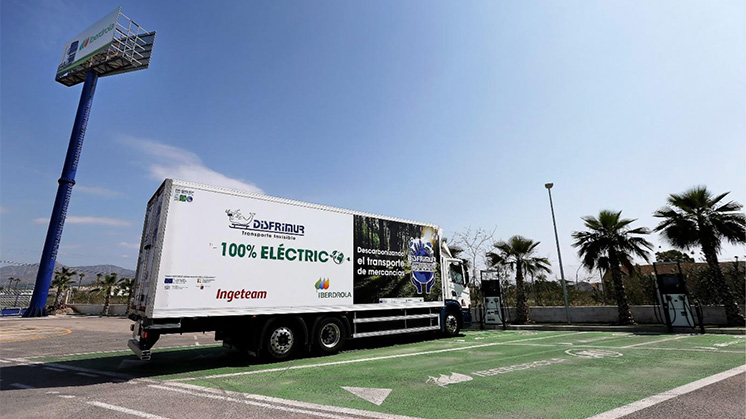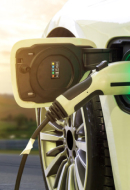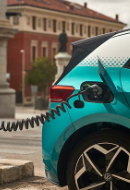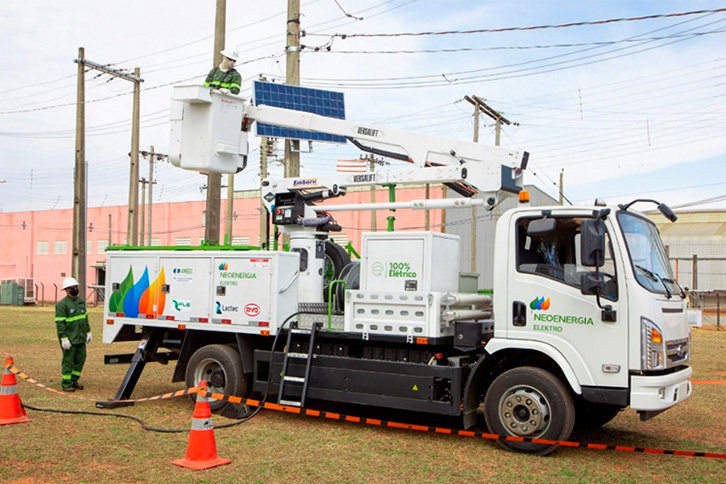Electric trucks
Electric trucks, the future of sustainable road logistics
Road transport logistics, fundamental to the global economy as it enables the transit of goods and products, has become one of the most polluting sectors. Faced with this challenge, electric trucks are emerging as the alternative for sustainable transport. Discover their growing role in road logistics and their contribution to the electrification of the economy.

Pollution and dependence on fossil fuels are the two main challenges facing global mobility. While combustion vehicles continue to drive on our roads, the data underpin the need to address a shift in transport: its emissions grew at an average annual rate of almost 1.7 % between 1990 and 2021 globally, faster than any other end-use sector, according to the International Energy Agency (IEA).
Achieving energy autonomy through electrification and renewable energies is the great challenge facing Europe if it is to avoid the pressures and threats to its economy and social model.
Road transport is responsible for approximately 24 % of all greenhouse gas emissions worldwide, according to the International Energy Agency (IEA). Although there is no precise figure on the exact percentage of emissions attributable to freight transport, it is estimated that it represents a considerable proportion of the total emissions of the transport sector. In Spain, road transport accounts for 26.8 % of total national greenhouse gas emissions and freight transport (97 % of which is by road in Spain) accounts for 8.19 %, according to official data from 2019.
Sustainable mobility is a key part of the energy transition: developing green transport is essential to achieve decarbonisation and mitigate the consequences of climate change. In the logistics sector, electric trucks present a technologically and economically viable solution as the most efficient and cleanest at our disposal to move towards a greener future. But how do they work and what are their advantages?
What are electric trucks and how do they work?
Electric trucks are freight vehicles that use electric motors instead of internal combustion engines powered by petrol or diesel. These trucks are powered by rechargeable batteries that supply energy to the motors, allowing them to travel without emitting harmful exhaust fumes and without relying on fossil fuels.
What is the charging process of an electric truck?
The electricity supply is very similar to that of an electric vehicle (EV), although it requires more time. An electric truck can charge up to 80% of its capacity in approximately 1 to 4 hours. With the new MCS chargers, this level of charging will be reached in less than 45 minutes, coinciding with mandatory stops.
Renewable installation
Electricity is generated from renewable energies.
Distribution line
Energy is distributed in a network that covers the centres of consumption.
Charging point
Depending on the use, they can have different power ratings, 100-200 kW for charging during truck idle periods or 350-1,200 kW for on-road charging.


MCS
The Megawatt Charging System (MCS) is a charging connector under development for electric vehicles with large batteries.
The connector will be able to reach 3,750 kW of power (3.75 MW), 10 times more than ultra-fast car charging.
Fast day-time charging
CCS2
These chargers operate on direct current and can provide up to 400 kW of power.
Fast day-time charging
Night-time charging

Battery
The battery stores electricity to power the motor. They are usually made of lithium-ion due to their high energy density and chargeability.
Electric motor
When electrical energy is supplied from the batteries, the motor converts it into mechanical energy to drive the wheels.
Other electrical components
Components such as controllers or inverters allow a stable and safe flow of electricity.

Long-haul electric trucks currently have a range of around 500 km, but trucks with a range of up to 1,000 km will soon be available

At present, electric trucks designed for short-, medium-, and long-distance transport have ranges of approximately 250 km, 350 km, and 600 km, respectively. Ongoing technological advances are expected to extend this to over 1,000 km in the coming years
 SEE INFOGRAPHIC: What is the charging process of an electric truck? [PDF]
SEE INFOGRAPHIC: What is the charging process of an electric truck? [PDF]
The electrification of road transport is different from that of private electric cars and commercial vehicles. The weights and dimensions of electric trucks require much larger batteries with more powerful recharging points, and the design of the infrastructure must also facilitate access for these vehicles given their dimensions and the required turning radii.
Advantages and disadvantages of the electric truck
Electric trucks offer several advantages over conventional internal combustion trucks:
 Emission reductions
Emission reductions
All-electric trucks produce no direct greenhouse gas emissions, which contributes to the reduction of air pollution and environmental impact. However, their effects on the environment depend on the type of energy used to generate the electricity (renewable or non-renewable). In any case, these vehicle models produce at least 63 % less emissions during their lifetime compared to diesel vehicles, according to a study by the International Council on Clean Transportation (ICCT).
Electrified heavy transport is guaranteed an emission-free future in a scenario where the energy mix is becoming increasingly renewable. This is the case, for example, in the European Union, which in 2021 obtained 22 % of its total energy from renewable energies, according to Eurostat.
 Less noise
Less noise
Electric motors are quieter than internal combustion engines, which reduces noise pollution in urban and residential areas.
 Low Emission Zones (LEZ)
Low Emission Zones (LEZ)
Low emission zones are specific areas of a city that restrict access to the most polluting vehicles. There are references of large cities that have been benchmarks in setting limits to road traffic. This is the case of Berlin, with its LEZ in operation since January 2008 and covering an area of 88 square kilometres. London also stands out, which in 2003 created a "congestion charge" or toll for the central area of the capital, and in 2019 inaugurated the Ultra Low Emission Zone. These benchmark measures are increasingly gaining ground in other cities and countries such as Spain, where at least 149 municipalities (those with more than 50,000 inhabitants) are obliged by the climate change law to have LEZs where the transport vehicle par excellence will be electric.
 Lower operating costs
Lower operating costs
Electric trucks have lower operating costs. Electricity is cheaper than petrol or diesel and electric vehicles have fewer moving parts and less maintenance requirements.
 Energy efficiency
Energy efficiency
Electric motors have a higher energy conversion efficiency and no energy losses associated with combustion. While green hydrogen and synthetic fuel have efficiencies of 28 % and 20 % respectively, the 100 % electric truck exceeds 77 %, i.e. electric is 3 to 5 times more efficient than other zero-emission alternatives.
 Technological evolution
Technological evolution
This type of transport represents a constantly evolving technology. With advances in battery capacity and charging infrastructure, electric trucks are expected to become increasingly viable and competitive in the freight transport market. Furthermore, their development also has positive consequences for other types of transport, such as tourism or electric buses, for example.
On the other hand, electric trucks still have a number of disadvantages. Their range is the main disadvantage, since in order to increase it, larger batteries have to be manufactured with a consequent increase in the vehicle's tare weight. The improved energy densities of the batteries allow us to think of a hopeful future with trucks with greater autonomy.
Moreover, recharging their batteries takes longer than filling up a tank of fuel (from 1.5 to 7 hours depending on the model and the infrastructure used) and it must be taken into account that the charging infrastructure is still under development. However, thanks to the new MCS (Megawatt Charging System) standard, the new generation trucks will be able to recharge at power ratings of more than 1 MW, making it possible to recover energy in less than 45 minutes, the same time as the mandatory rest stop.
The prices of electric trucks vary greatly depending on their characteristics and manufacturers, but they tend to have a higher initial cost compared to internal combustion engines, although these decrease over time. According to a study by the German consultancy BCG, electric trucks will match the selling price of diesel trucks by 2025.

Electric buses
The electric bus revolution.

Electric bikes
Would you like to be part of the future of urban mobility?

Electric car batteries
Everything you need to know about electric car batteries.

Advantages of the electric car
Why should I buy an electric car?
Electric trucks around the world: state of the industry
The electric truck sector is experiencing significant growth worldwide. Highlights:
- China. A leader in the electric truck market, China has experienced rapid growth in recent years. Manufacturers such as BYD, SANY and JAC Motors stand out. The government has implemented policies and subsidies to encourage the adoption of electric vehicles for freight transport.
- United States. The electric truck market is growing exponentially in the US, with numerous manufacturers launching or planning to launch electric truck models. One example is Tesla. Incentive and financing programmes are also being implemented to promote adoption.
- Europe. Interest in electric trucks in Europe is also growing. Several European manufacturers —such as Scania, MAN, Volvo or Daimler Trucks— are developing different models and there is a growing focus on charging infrastructure. In addition, stricter regulations are being implemented to reduce emissions in the transport sector.
In particular, the deployment of electric trucks in Spain is just beginning. The sector is at an early stage compared to other countries, but it continues to grow. For example, there are already the first ultra-fast charging stations adapted for trucks. In addition, together with Disfrimur, we have launched the first Mediterranean corridor for emission-free heavy road transport, with the first specific stations for electric trucks.
Above all, the outlook is encouraging. According to a study by the US consulting firm McKinsey, more than half of all trucks registered in Europe, the United States and China will be electric by 2035.
The Future of Electric Trucks
The deployment of electric mobility, and electric trucks in particular, presents several challenges to be addressed in order to achieve wider adaptation. Some of the main trends in the industry are:
- Increased range. Manufacturers are working to increase the range of electric trucks, a key factor in improving efficiency and reducing downtime. The goal is to give these vehicles greater range and enable them to compete with diesel trucks in terms of mileage.
- Increasing demand. Demand for electric trucks is increasing as a result of increased environmental concerns, stricter regulation on emissions and the need to lower operating costs.
- Development of charging infrastructure. The creation of an adequate charging infrastructure, especially ultra-fast and mega-fast, is a key factor in the deployment of electric trucks. Much of the efforts around electric mobility focus on increasing this very high-power network with chargers of more than 1 MW.
- Increased investment in technology. Companies are increasingly investing in research and development of technology for electric trucks with the aim of improving energy efficiency, range, capacity and charging time. On this last point, the most promising advances are coming from the Megawatt Charging System (MCS), which is under development and will enable faster charging as mentioned above.






